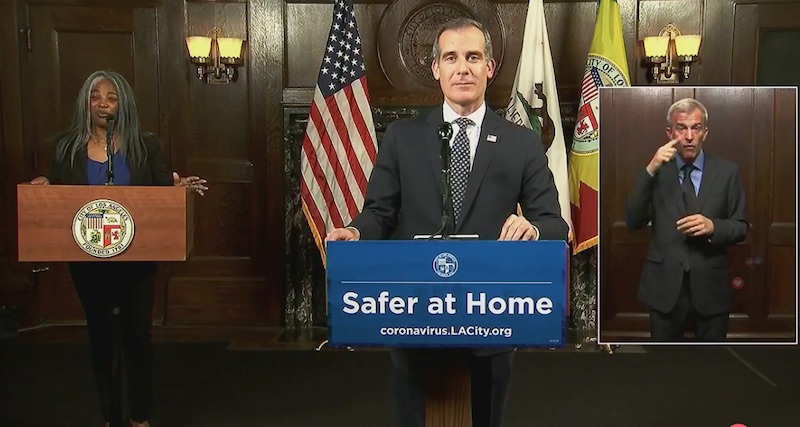
During today’s briefing, Mayor Eric Garcetti highlighted the mental strain the COVID-19 pandemic is having on us all. Some of us may be dealing with job loss or the stress of suddenly working or schooling from home. Others may be braving the frontlines daily, whether we work in healthcare or a grocery store. Whatever your situation, the way you’re feeling is probably much different now than just six months ago. A recent report covered by Fast Company suggests we may even experience an “overflow of mental illness that will inevitably emerge from this pandemic.”
To address mental health concerns, today’s briefing featured Michelle Cauley, a Los Angeles therapist and licensed clinical social worker. She outlined symptoms of depression and anxiety to look for in adults and children and offered some methods and resources to help.
Cauley said depression and anxiety can look different in everyone and symptoms vary among adults and children. According to Cauley:
Symptoms of depression in adults may include:
- Feeling like you’re having a down mood
- A loss of pleasure in activities you typically enjoy
- Changes in appetite
- Changes in sleeping habits
- A sense of agitation
Symptoms of depression in children may include:
- A sense of sadness or hopelessness
- Irritability
- Complaints of boredom
- Poor concentration
- Low energy levels
Symptoms of anxiety in adults may include:
- Internal symptoms, such as worry, rumination, feeling tired, or trouble concentrating
- External symptoms, such as headache, upset stomach, tension, fatigue, insomnia, or feeling like you’re having a panic attack or heart attack
Symptoms of anxiety in children may include:
- Extreme and unrealistic worry
- Being very self-conscious
- A strong need for reassurance
- Physical complaints without a basis for them
To cope, Cauley suggested the following strategies:
Acknowledge what’s going on. Give yourself “the space to be able to really, openly talk about” and unpack your feelings. An example might be a teen who acknowledges they’re disappointed to miss their graduation or Prom.
Communication. Cauley said there is no substitute for communicating with others. Share and listen with friends and family, whether that’s online, over the phone, or even by written letter.
Create a list of things to try, recognizing that what works will be different for everyone. Cauley’s suggestions include reaching out to a mental health professional; finding an online support group or 12-step program; journaling; exercise; prayer, mindfulness, or meditation; managing your finances, especially if they’ve become a source of stress; paying attention to your nutrition, and positive affirmation. Cauley also suggests finding three things each day to be grateful for to inspire optimism and hope.
You can also contact the Los Angeles Department of Mental Health‘s hotline at (800) 854-7771 or use the Crisis Text Line by texting HOME to 741741. The Department of Mental Health also has a list of additional resources here.
advertisements
